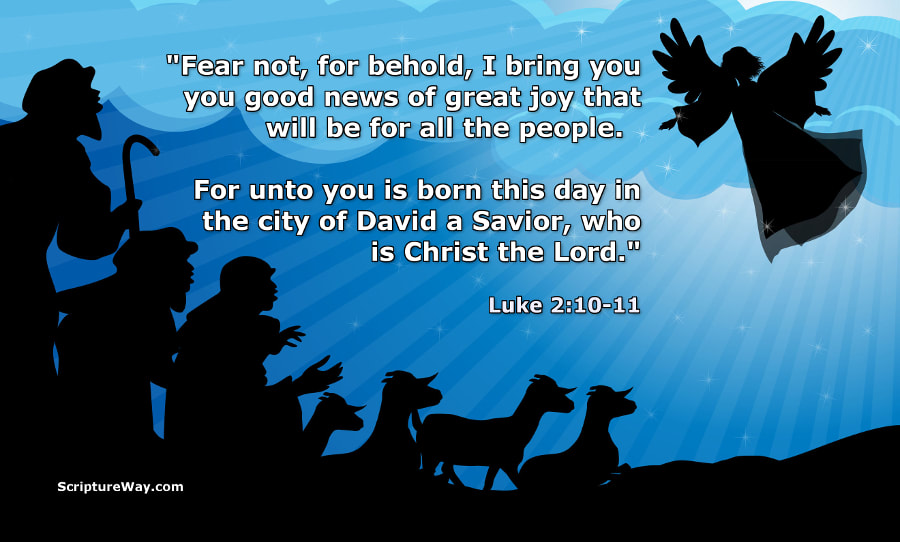"And the angel said to them, 'Fear not, for behold, I bring you good news of great joy that will be for all the people. For unto you is born this day in the city of David a Savior, who is Christ the Lord.'" (Luke 2:10-11)
This article is the third in a series on the "'Fear Nots' of the Bible" (Ref. 1, Ref. 2). This article presents the "Fear not" angelic encounters with Zacharias, Mary, and the shepherds in Luke chapters 1 and 2.
Consider. Do you regard the announcement of the birth of Jesus as good news? If so, are you telling others? Are you rejoicing because you know Jesus as your Savior?
Introduction
Angels are active in both the Old Testament and New Testament scriptures. Angels bring announcements and special messages of encouragement from God to specific people.
In the New Testament, the Greek word for angel is aggelos. Aggelos means a messenger or delegate, someone sent by God to proclaim His message (Ref. 3). Matthew chapter 1 describes the first appearance of an angel in the New Testament. An angel of the Lord appears to Joseph in a dream, saying, "Joseph, thou son of David, fear not to take unto thee Mary thy wife: for that which is conceived in her is of the Holy Spirit" (Matthew 1:20). Supernatural angelic appearances to humans in the scriptures often, but not always, begin with "Fear not," also translated as "Do not fear" or "Do not be afraid" (Ref. 1, Ref. 2). The Angel Gabriel Appears to Zacharias
Luke 1:5-25 tells us about the angel Gabriel's appearance to the priest Zacharias and the angel's message foretelling the birth of John the Baptist.
When Gabriel appears to Zacharias in the temple, Zacharias is troubled and fearful (Luke 1:12). In Luke 1:13 NKJV, the angel's message to Zacharias has four main points: 1) "Do not be afraid" ("Fear not" in the KJV), 2) "Your prayer is heard," 3) "Your wife Elizabeth will bear you a son" and 4) "You shall call his name John." Gabriel tells Zacharias that John will be great in the sight of the Lord (Luke 1:15), will be filled with the Holy Spirit (Luke 1:15), will turn back many children of Israel to the Lord (Luke 1:16), and will go before the Lord (Luke 1:17). The angel Gabriel tells Zacharias that this message is good news, also translated as glad tidings (Luke 1:19 NASB, Luke 1:19 NKJV). The Greek word for good news and glad tidings is euaggelizó (Ref. 4). We will see the same word again in Luke 2:10. Scripture tells us that Zacharias and Elizabeth were righteous and blameless in following the Lord's commandments (Luke 1:5-6). However, Zacharias does not believe (have faith in, trust in) the angel's "good news" message (Luke 1:20, Ref. 5). Disbelief in God's message has consequences. Zacharias is not able to speak until the prophecy is fulfilled when John is born (Luke 1:57, 63). When his mouth is opened, Zacharias speaks and praises God (Luke 1:64). The Angel Gabriel Appears to Mary
Gabriel greets Mary with the words, "Rejoice, highly favored one, the Lord is with you; blessed are you among women!" (Luke 1:28) The Greek word for favored is charitoó, which means highly-favored because receptive to God's grace (Ref. 7).
The Scripture says, "Mary was greatly troubled at his words and wondered what kind of greeting this might be" (Luke 1:29). Unlike Zacharias (Luke 1:12), Mary was not terrified by the angel's appearance or presence. However, she was perplexed by what the angel meant by his greeting. The angel responds and tells her, "Fear not, Mary: for thou hast favour with God"(Luke 1:30 KJV).
Gabriel then states the substance of his message to Mary. "And behold, you will conceive in your womb and bring forth a Son, and shall call His name Jesus. He will be great, and will be called the Son of the Highest; and the Lord God will give Him the throne of His father David. And He will reign over the house of Jacob forever, and of His kingdom there will be no end" (Luke 1:31-33). Then Mary asks Gabriel a very interesting question - "How can this be, since I do not know a man?" (Luke 1:34) The Greek word for know in this verse is ginóskó, which means know through personal experience and in this context refers to sexual intimacy (Ref. 8). Mary did not doubt the angel's word. From her humility and modesty she wondered how her pregnancy could be effected in her virgin state (Ref. 9). The angel Gabriel replies and says, "The Holy Spirit will come upon you, and the power of the Highest will overshadow you; therefore, also, that Holy One who is to be born will be called the Son of God" (Luke 1:35). Gabriel also says, "For with God nothing will be impossible" (Luke 1:37). Mary then humbly speaks her assent and consent to the will of God. "Behold the maidservant of the Lord! Let it be to me according to your word" (Luke 1:38). The Greek word for Let it be is ginomai, which means come into being, happen, and become (Ref. 10). The angel then departs, having accomplished what he came for (Luke 1:38). The Angel Announces the Savior's Birth to the Shepherds “Fear not, for behold, I bring you good news of great joy that will be for all the people” (Luke 2:10) - LUMO Project - Used by Permission “Fear not, for behold, I bring you good news of great joy that will be for all the people” (Luke 2:10) - LUMO Project - Used by Permission
In Luke 2:8-14 the gospel writer describes the glorious announcement of the birth of the Savior. Previously, Luke had described the Angel Gabriel's message to Mary about the conception of Jesus, the Son of God (Luke 1:26-38). In the verses immediately before the angel's announcement to the shepherds (Luke 2:1-7), the gospel account informs us that Joseph and Mary had traveled from Nazareth to Bethlehem, and that her Son now was born.
The Scripture tells us that an angel (name not identified) suddenly stands before shepherds who were outside Bethlehem at night (Luke 2:8-9). The scripture states "And the glory of the Lord shone around them" (Luke 2:9, italics added). The brilliant glory of the Lord around the shepherds during the angel's announcement is unique compared to the appearance of Gabriel to Zacharias in Luke 1:8-25 and to Mary in Luke 1:26-38. The Apostle Paul reports a similar encounter with bright light around himself and his traveling companions on the way to Damascus (Acts 26:13).
The shepherds "feared with a great fear" at the angel's sudden appearance (Luke 2:9 DRA). The King James Version famously says "they were sore afraid" (Luke 2:9 KJV).
The angel tells the shepherds, "Fear not" (Luke 2:10). Yes, the appearance of the angel was supernatural; however, the angel's message about the birth of Christ is good news, not bad news. "For behold, I bring you good news of great joy that will be for all the people. For unto you is born this day in the city of David a Savior, who is Christ the Lord" (Luke 2:10-11). The Greek verb for bring good news is euaggelizó which also is translated as bring good tidings (Ref. 4).
The Greek word for Savior in Luke 2:11 is sótér, which means savior, deliverer, preserver (Strong's Concordance, Ref. 11). Jesus Christ is our Savior because he "saves believers from their sins and delivers them into His safety" (HELPS Word-studies, Ref. 11, 1 John 4:14, 1 Timothy 1:15, Luke 19:10).
The shepherds considered the angel's message, and then they went with haste, without delay to see the Savior themselves (Luke 2:15-16). After they had seen Jesus, they told others the good news about Jesus (Luke 2:17). Then the shepherds returned, "glorifying and praising God for all they had heard and seen" (Luke 2:20).
Apply. Like the shepherds, have you accepted the good news of the Savior for yourself? If not, then believe that he is the Son of God as described in the scriptures, and ask him to forgive your sins. Then go on your way rejoicing and tell others the good news about Jesus.
References
1. http://www.scriptureway.com/home/fear-nots-of-the-old-testament 2. http://www.scriptureway.com/home/fear-nots-of-jesus 3. https://biblehub.com/greek/32.htm 4. https://biblehub.com/greek/2097.htm 5. https://biblehub.com/greek/4100.htm 6. https://biblehub.com/greek/3933.htm 7. https://biblehub.com/greek/5487.htm 8. https://biblehub.com/greek/1097.htm 9. https://biblehub.com/commentaries/benson/luke/1.htm 10. https://biblehub.com/greek/1096.htm 11. https://biblehub.com/greek/4990.htm
1 Comment
"They all saw Him and were terrified. But immediately He spoke with them and said to them, 'Take courage; it is I, do not be afraid.'" (Mark 6:50) This article is the second in a series on the "'Fear Nots' of the Bible." The first article presented the "'Fear Nots' of the Old Testament" (Ref. 1). In the Old Testament, God assured the Israelites, "Fear not, for I am with you" (Isaiah 41:10). Moses encouraged the Israelites about the Lord's presence with them, "Do not be afraid or tremble at them, for the Lord your God is the one who goes with you. He will not fail you or forsake you" (Deuteronomy 31:6). This article presents statements of Jesus where he tells us to "Fear not" or "Do not be afraid." Jesus Christ, the Son of God, assures those who believe in him and follow him that we have no reason to fear. Consider. In what areas of your life are you afraid? With what circumstances or trials would you like Jesus to give you courage and peace? Definition of Fear Unless indicated otherwise, the verses in this article use the Greek word phobeó for fear or afraid (Ref. 2). The New Testament uses phobeó to mean put to flight (withdraw from), terrify, frighten, dread, or reverence (Ref. 2). Jesus Gives Us Courage in the Midst of Our Trials Recall the event when Jesus walked on the water of Lake Galilee late at night to come to his disciples who were struggling with rowing against the wind (read here, Mark 6:45-52). In Mark 6:48 the Greek language uses a serious word to describe the disciple's situation. The New American Standard Bible says the disciples were straining at the oars for the wind was against them. The Greek word for straining is basanizó, which means a tormenting trial, to examine by using torture (Ref. 3). Wow. Jesus took the initiative and came to his disciples during their tormenting trial at sea (Mark 6:48). The disciples saw Jesus approaching, but did not recognize him at first. They thought he was a ghost, and they were frightened (Mark 6:49-50). Jesus said to them, and he says to us in our trial, "Take courage; it is I, do not be afraid" (Mark 6:50). The Greek word for courage is tharseó, which means emboldened from within (Ref. 4). For the believer, bold courage is infused by the Lord and means "living out the inner confidence (inner bolstering) that is Spirit-produced" (Ref. 4). By faith, Jesus gives us courage (inner boldness and confidence) during our trials. His presence with us calms our storms (Mark 6:51, Mark 4:38-39). Believing in Jesus is the Remedy for Our Fear A synagogue official named Jairus came to Jesus and urgently asked Jesus, "My little daughter is at the point of death; please come and lay Your hands on her, so that she will get well and live" (Mark 5:22-23). While on the way, bad news came from the house of the synagogue official. "Your daughter has died; why trouble the Teacher anymore?" (Mark 5:35). Jesus disagreed with the advice of the bad news bearer to not trust further in Jesus. Jesus immediately said to Jairus, "Fear not, only believe" (Mark 5:36). In the face of bad news, believing in (trusting in, having faith in) Jesus is the only remedy for our grief and fear (Ref. 5, Ref. 6). Jesus knew that he "had things under control." Jairus only needed to believe. Jesus went on to raise Jairus' daughter from the dead (Mark 5:40-42). God Knows Us, Values Us, and Cares for Us Jesus said, "Are not two sparrows sold for a copper coin? And not one of them falls to the ground apart from your Father’s will. But the very hairs of your head are all numbered. Do not fear therefore; you are of more value than many sparrows" (Matthew 10:29-31). English Theologian John Gill (1697 - 1771) wrote, "If God takes care of sparrows and is concerned for their lives, much more will he take care of his faithful ministers, and not suffer their lives to be taken away, till they have done the will and work of their Lord" (Ref. 7, Ref. 8). Jesus Gives Give Us Peace that the World Cannot Give On the evening before his death, Jesus said to his disciples, "Peace I leave with you; My peace I give to you; not as the world gives do I give to you. Do not let your heart be troubled, nor let it be fearful" (John 14:27). Jesus gives his disciples peace. The peace that Jesus gives dispels our fear. The Greek word for peace in John 14:27 is eiréné. Eiréné (peace) is God's gift of wholeness including peace of mind (Ref. 9). The invocation of peace (shalom in Hebrew) also was a common Jewish farewell, in the Hebraistic sense of the health (welfare), security, safety, and prosperity of an individual (Ref. 10, 1 Samuel 1:16-18, 1 Samuel 20:42). The Greek word for fear in John 14:27 is deiliaó, which means to be cowardly (Ref. 11). Deiliaó is used only this one time in the New Testament. Jesus' presence and his words bring comfort, courage, and peace to his disciples then and now. Apply. If you do not yet know Jesus, put your faith and trust in him. Believing in Jesus is the only remedy for your fear. If you do know Jesus, and you are going through a difficult time, pray, and put your trust in Jesus. He will provide you the comfort, courage, and peace that you seek. References
1. http://www.ScriptureWay.com/home/fear-nots-of-the-old-testament 2. https://biblehub.com/greek/5399.htm 3. https://biblehub.com/greek/928.htm 4. https://biblehub.com/greek/2293.htm 5. https://biblehub.com/greek/4100.htm 6. https://biblehub.com/commentaries/mhc/mark/5.htm 7. https://biblehub.com/commentaries/gill/matthew/10.htm 8. https://en.wikipedia.org/wiki/John_Gill_(theologian) 9. https://biblehub.com/greek/1515.htm 10. https://biblehub.com/hebrew/7965.htm 11. https://biblehub.com/greek/1168.htm
"Fear not, for I am with you; Be not dismayed, for I am your God. I will strengthen you, Yes, I will help you, I will uphold you with My righteous right hand." (Isaiah 41:10)
This article is the first in a series on the "'Fear Nots' of the Bible." This article presents God's divinely encouraging "Fear not" and "Do not be afraid" statements from the Old Testament.
Consider. In our troubles and challenges of life, God comes to us and says, "Fear not," and "Do not be afraid." In addition to telling us, "Do not be afraid," God encourages us because God is with us and blesses us in a variety of ways.
God is Our Shield
Genesis 15:1 - "After these things the word of the Lord came to Abram in a vision, saying, 'Do not be afraid, Abram. I am your shield, your exceedingly great reward.'" God is our protector and defense.
God Blesses His People
Genesis 26:24 - "And the Lord appeared to him* the same night and said, 'I am the God of your father Abraham; do not fear, for I am with you. I will bless you and multiply your descendants for My servant Abraham’s sake.'"
* Isaac, Abraham's son The Merriam-Webster Dictionary defines bless as invoke divine care, confer prosperity, protect, and endow with favor (Ref. 1). God Saves His People
When the Egyptian army was about to overtake the Israelites, and immediately before God divided the sea, Moses said to the Israelites, "Do not be afraid. Stand still, and see the salvation of the Lord, which He will accomplish for you today..." (Exodus 14:13).
When the Moabites and Ammonites came to make war against Jehoshaphat, the Spirit of the Lord came upon Jahaziel and he spoke to the Israelites (2 Chronicles 20:14). "You will not need to fight in this battle. Position yourselves, stand still and see the salvation of the Lord, who is with you, O Judah and Jerusalem! Do not fear or be dismayed; tomorrow go out against them, for the Lord is with you" (2 Chronicles 20:17). The Hebrew word for salvation in Exodus 14:13 and 2 Chronicles 20:17 is yeshuah, pronounced yesh-oo'-aw (Ref. 2). Yeshua also is the modern Hebrew name for Jesus of Nazareth (Ref. 3). In English, the name Yeshua is extensively used by followers of Messianic Judaism (Ref. 3). God Goes with His Servants into Battle
Deuteronomy 20:2-4 - "So it shall be, when you are on the verge of battle, that the priest shall approach and speak to the people. And he shall say to them, 'Hear, O Israel: Today you are on the verge of battle with your enemies. Do not let your heart faint, do not be afraid, and do not tremble or be terrified because of them; for the Lord your God is He who goes with you, to fight for you against your enemies, to save you.'"
God Never Fails or Forsakes His People Moses Says to Joshua, "The Lord is the one who goes ahead of you; He will be with you. He will not fail you or forsake you. Do not fear or be dismayed" (Deuteronomy 31:8). Moody Publishers / FreeBibleimages.org. Moses Says to Joshua, "The Lord is the one who goes ahead of you; He will be with you. He will not fail you or forsake you. Do not fear or be dismayed" (Deuteronomy 31:8). Moody Publishers / FreeBibleimages.org.
In Moses' last counsel to all the Israelite people, Moses said, "Be strong and courageous, do not be afraid or tremble at them, for the Lord your God is the one who goes with you. He will not fail you or forsake you" (Deuteronomy 31:1, 6).
Moses then said to his successor, Joshua, "The Lord is the one who goes ahead of you; He will be with you. He will not fail you or forsake you. Do not fear or be dismayed" (Deuteronomy 31:8). God Strengthens Us, Helps Us, and Supports Us
Isaiah 41:10 - "Fear not, for I am with you; Be not dismayed, for I am your God. I will strengthen you, Yes, I will help you, I will uphold you with My righteous right hand."
God is Our Companion in Trials
Isaiah 43:1-2 - "Fear not, for I have redeemed you; I have called you by your name; You are Mine. When you pass through the waters, I will be with you; And through the rivers, they shall not overflow you. When you walk through the fire, you shall not be burned, Nor shall the flame scorch you."
God indeed has redeemed his people. The Hebrew word for redeem is gaal, which means to act as a kinsman and to buy back a relative's property (Ref. 4). God has already demonstrated that his promises in Isaiah 43:1-2 are true. God parted the sea for the Israelites to pass through on dry land (Exodus 14:15-16). God caused the Jordan River to rise up in a heap so it would not overflow the Israelites when they crossed on dry ground (Joshua 3:13-17). Recall that King Nebuchadnezzar had Shadrach, Meshach, and Abed-Nego cast into the blazing furnace of fire because they would not serve Nebuchadnezzar's gods (Daniel 3:16-20). Scripture tells us that King Nebuchadnezzar saw in the fire a divine companion that God provided to be with Shadrach, Meshach, and Abed-Nego during their trial. "'Look!' he answered, 'I see four men loose, walking in the midst of the fire; and they are not hurt, and the form of the fourth is like the Son of God'" (Daniel 3:25).
Apply. How do you need God's encouragement today to "Fear not" or "Do not be afraid"? Claim God's promises to be present with you, to bless you, to strengthen you, and to give you courage.
|
Daily Bible Verse(Click the link above) AuthorMr. Whitney V. Myers. Christian. For more information, please visit the Author Page. Posting ScheduleI plan to provide new postings about once a month. Planned Topics(subject to change) Recent Posts(most recent three months) Popular Posts(top 10) Categories
All
Archives
July 2024
|
|
Copyright 2018-2024 Whitney V. Myers |
Listed in Feedspot's Top 100 Bible Study Blogs and Websites |




 RSS Feed
RSS Feed
